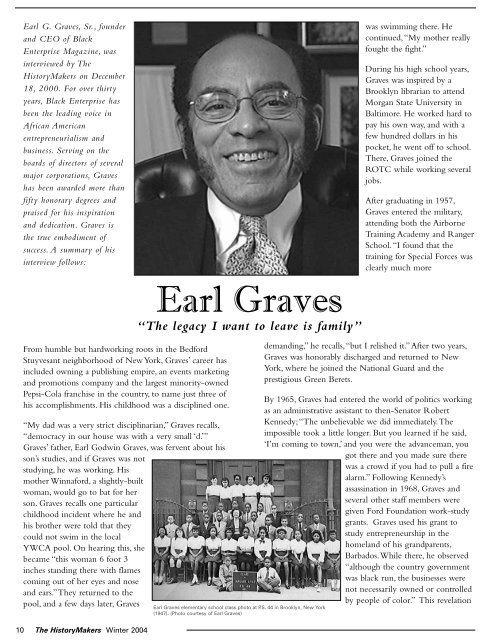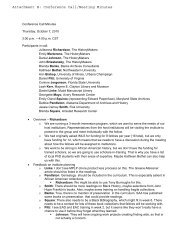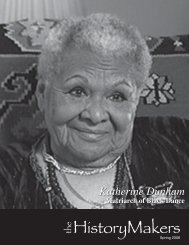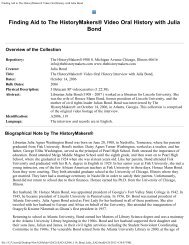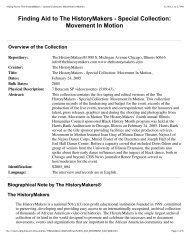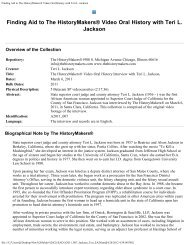The History Makers
The History Makers
The History Makers
You also want an ePaper? Increase the reach of your titles
YUMPU automatically turns print PDFs into web optimized ePapers that Google loves.
Earl G. Graves, Sr., founder<br />
and CEO of Black<br />
Enterprise Magazine, was<br />
interviewed by <strong>The</strong><br />
<strong>History</strong><strong>Makers</strong> on December<br />
18, 2000. For over thirty<br />
years, Black Enterprise has<br />
been the leading voice in<br />
African American<br />
entrepreneurialism and<br />
business. Serving on the<br />
boards of directors of several<br />
major corporations, Graves<br />
has been awarded more than<br />
fifty honorary degrees and<br />
praised for his inspiration<br />
and dedication. Graves is<br />
the true embodiment of<br />
success. A summary of his<br />
interview follows:<br />
was swimming there. He<br />
continued,“My mother really<br />
fought the fight.”<br />
During his high school years,<br />
Graves was inspired by a<br />
Brooklyn librarian to attend<br />
Morgan State University in<br />
Baltimore. He worked hard to<br />
pay his own way, and with a<br />
few hundred dollars in his<br />
pocket, he went off to school.<br />
<strong>The</strong>re, Graves joined the<br />
ROTC while working several<br />
jobs.<br />
After graduating in 1957,<br />
Graves entered the military,<br />
attending both the Airborne<br />
Training Academy and Ranger<br />
School.“I found that the<br />
training for Special Forces was<br />
clearly much more<br />
Earl Graves<br />
“<strong>The</strong> legacy I want to leave is family”<br />
From humble but hardworking roots in the Bedford<br />
Stuyvesant neighborhood of New York, Graves’ career has<br />
included owning a publishing empire, an events marketing<br />
and promotions company and the largest minority-owned<br />
Pepsi-Cola franchise in the country, to name just three of<br />
his accomplishments. His childhood was a disciplined one.<br />
“My dad was a very strict disciplinarian,” Graves recalls,<br />
“democracy in our house was with a very small ‘d.’”<br />
Graves’ father, Earl Godwin Graves, was fervent about his<br />
son’s studies, and if Graves was not<br />
studying, he was working. His<br />
mother Winnaford, a slightly-built<br />
woman, would go to bat for her<br />
son. Graves recalls one particular<br />
childhood incident where he and<br />
his brother were told that they<br />
could not swim in the local<br />
YWCA pool. On hearing this, she<br />
became “this woman 6 foot 3<br />
inches standing there with flames<br />
coming out of her eyes and nose<br />
and ears.”<strong>The</strong>y returned to the<br />
pool, and a few days later, Graves<br />
10 <strong>The</strong> <strong>History</strong><strong>Makers</strong> Winter 2004<br />
Earl Graves elementary school class photo at P.S. 44 in Brooklyn, New York<br />
(1947). (Photo courtesy of Earl Graves)<br />
demanding,” he recalls,“but I relished it.” After two years,<br />
Graves was honorably discharged and returned to New<br />
York, where he joined the National Guard and the<br />
prestigious Green Berets.<br />
By 1965, Graves had entered the world of politics working<br />
as an administrative assistant to then-Senator Robert<br />
Kennedy;“<strong>The</strong> unbelievable we did immediately.<strong>The</strong><br />
impossible took a little longer. But you learned if he said,<br />
‘I’m coming to town,’ and you were the advanceman, you<br />
got there and you made sure there<br />
was a crowd if you had to pull a fire<br />
alarm.” Following Kennedy’s<br />
assassination in 1968, Graves and<br />
several other staff members were<br />
given Ford Foundation work-study<br />
grants. Graves used his grant to<br />
study entrepreneurship in the<br />
homeland of his grandparents,<br />
Barbados.While there, he observed<br />
“although the country government<br />
was black run, the businesses were<br />
not necessarily owned or controlled<br />
by people of color.” This revelation


